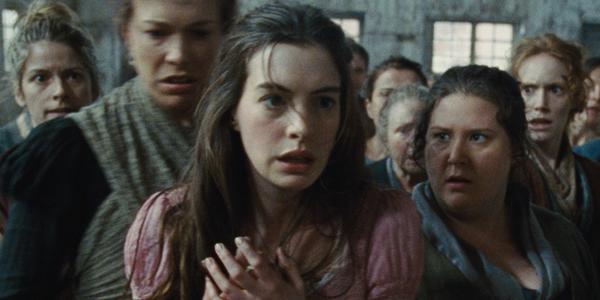Les Misérables Review: A Risky Musical Triumph
Donovan's Rating: 8.5/10
Fused Rating: 8.0/10
(3 reviews total)
Based on the popular stage musical derived from the classic Victor Hugo novel,
Les Misérables sees convict Jean Valjean (a magnificent Hugh Jackman) fleeing the hot pursuits of Inspector Javert (a wobbly Russell Crowe), but it also incorporates stories about a woman who will commit the direst of acts to save her child’s life, the innkeepers who “take care” of the child, and this little thing called the June Rebellion.
Like its source material, Tom Hooper’s adaptation sees many threads coming together to tell one exceptional story, and the director of
The King’s Speech mostly succeeds in his aims to take this musical to film despite the many difficulties involved with any stage-to-screen transfer. The costumes and set decoration – a mix of the lavish, the lousy, and the outlandish –set the historical tone for
Les Mis, but the Dutch angle shots often detract from the emotions of the moment and the actions on the screen.

Hooper also takes a huge risk in having the actors perform most of their vocals live instead of in a studio, but it’s a move that pays off in spades. This risk allows the actors to live in the moment instead of match their mouth movements with prerecorded vocals. Plus, it’s the film’s amazing ensemble cast and its (mostly) exceptional delivery of song that help us ignore – or at least somewhat forgive – some of the awkward cinematography.
The film opens as Jackman is under Crowe’s jurisdiction. In these moments Jackman commands the screen with his physicality and his vocals. His performance loses the physical edge as the film progresses, but he’s no less powerful throughout. Crowe, on the other hand, carries so little edge in
Les Mis. Sure, he makes for a threatening presence throughout and fulfills his arc beautifully and brings his performance home in his final scene, but there’s more to musicals than simply delivering strong
acting. His vocal tone and range simply doesn’t fit with the role, and Crowe’s curious participation sticks out like a sore thumb with a soaring vocal expert like Jackman —not to mention the others — singing circles around him faster than he can warble, “24601.”

Jackman fulfills his sentence and tries to make an honest man of himself. In doing so, he changes his identity, becomes a mayor, and runs a business. But such an identity change doesn’t keep Javert out of his life. More importantly – for the moment, at least – Anne Hathaway enters the framework as Fantine, the mother who works only for the sake of her daughter, Cosette.
With such an exceptional dedication to her performance, Hathaway arrests you in every moment she appears on screen – even before her past begins to haunt her. Through sniffles and tears, she delivers “I Dreamed a Dream,” the musical’s signature number, in one take during her character’s darkest hour. And it’s a performance so riveting, so heartbreaking, and so vocally powerful that it grabs your attention and your heart.
A promise Jackman makes to Hathaway takes him to the Thénardiers, an innkeeper couple played by Helena Bonham Carter and Sacha Baron Cohen. As these dastardly innkeepers, the duo that appeared together in another musical,
Sweeney Todd: The Demon Barber of Fleet Street, employs both astute physical comedy and humorous yet succinct vocal delivery to provide the comic relief this dark yet beautiful tale so desperately needs now and then. Of course, it’s a kind of black comedy as they’re cruel to the young Cosette. Isabelle Allen gets little time to shine as this character, but she tackles the role – particularly “Castle on a Cloud” – like a young pro instead of a professional youngster.

Jackman rescues her from the Thénardiers and becomes her guardian, at which point the actors build brief yet nice chemistry as father and daughter. But the charming Allen grows up to become the wide-eyed, opera-trained Amanda Seyfried, who clearly gets a better vehicle for her numerous talents than the other musical in which she starred even though she’s not called on to do too much here either. This is also where the June Rebellion becomes integral to the plot. And yes, Crowe’s still warbling as Javert.
Aaron Tveit showcases his vocal strengths as revolution leader Enjolras, but he doesn’t get the chance to shine aside from delivering powerhouse vocals. As his counterpart Marius, Eddie Redmayne falls in love and gets his heart crushed by loss, and he does so more successfully than he did in
My Week with Marilyn. Samantha Barks, a newcomer to the film world, more than holds her own opposite Redmayne as the Thénardiers’ daughter Éponine. She flirts with Redmayne, but he doesn’t notice. She smiles at him, but he doesn’t care. You can feel the pain she carries inside even before she walks rainy streets while she singing “On My Own.” Barks’ understated performance of this big song wholly defines the character.

To recap, at this point,
Les Mis gives Seyfried a love interest, leads into an action-oriented plot, and continues the Valjean-vs-Javert narrative. This mixing of plots sounds a bit slapdash, sure, but it all comes together in such beautiful crescendos – particularly the ensemble number “One Day More” – and also works well in context and keeps the chain of events moving at a relatively brisk pace while not getting too carried away.
Les Mis ends on an inspiring and likely tear-inducing note that brings together on screen the cast that expertly sells this heartbreaking and painful yet uplifting and beautiful story through song. Yes, Hooper’s affinity for Dutch angle hinders
Les Mis in some spots, but the director handles this musical with great precision (though not necessarily nuance), getting some strong close-ups to highlight the magnificent performances of the ensemble.
He’s come a long way in just two years since his fun little trifle
The King’s Speech dominated a large chunk of the awards season in 2010. He might do the same again with this musical, but that’s neither here nor there in the realm of film criticism (despite what some might say). All that matters is Hooper crafted something masterful with
Les Misérables.
Rating: 8.5/10
 Steven thought:
Steven thought: "While most movie adaptations of musicals use the big screen to tear down the confines of the stage, Hooper zooms in even closer — literally. With such powerful and reliable material, our scrutiny falls on his direction, which chooses to highlight the actors above all else. The result is that
Les Mis offers some of the very best movie musical performances ever, especially from Jackman and Hathaway, as Hooper's technique leaves them nowhere to hide. At the same time, it can be a bit claustrophobic, and sacrifices the musical's sweeping epic qualities; the intimate moments succeed at providing the emotional punch, but the bigger ensemble numbers aren't nearly as effective. Despite some missteps, this is a worthy adaptation that utilizes its talent to the fullest to bring new insight (and some much-needed clarity) to a show heard and seen the world over."
Rating: 8/10
John thought: "Les Misérables is a boxer too intent on landing a knockout punch. Every swing for the fences leaves him open to attack. Director Tom Hooper actually lands his jabs. The film’s softer, less stylized moments are both effective and affecting. When Hooper’s manic camera plants its ass in front of the tragic faces of Anne Hathaway and Eddie Redmayne, it’s exceptional. These moments, sadly, are few and far between. It would be unfair to call the film unsuccessful because the music and performances are so enjoyable, but it definitely doesn’t hit that punch it so wildly swings for."
Rating: 7.5/10
 Hooper also takes a huge risk in having the actors perform most of their vocals live instead of in a studio, but it’s a move that pays off in spades. This risk allows the actors to live in the moment instead of match their mouth movements with prerecorded vocals. Plus, it’s the film’s amazing ensemble cast and its (mostly) exceptional delivery of song that help us ignore – or at least somewhat forgive – some of the awkward cinematography.
The film opens as Jackman is under Crowe’s jurisdiction. In these moments Jackman commands the screen with his physicality and his vocals. His performance loses the physical edge as the film progresses, but he’s no less powerful throughout. Crowe, on the other hand, carries so little edge in Les Mis. Sure, he makes for a threatening presence throughout and fulfills his arc beautifully and brings his performance home in his final scene, but there’s more to musicals than simply delivering strong acting. His vocal tone and range simply doesn’t fit with the role, and Crowe’s curious participation sticks out like a sore thumb with a soaring vocal expert like Jackman —not to mention the others — singing circles around him faster than he can warble, “24601.”
Hooper also takes a huge risk in having the actors perform most of their vocals live instead of in a studio, but it’s a move that pays off in spades. This risk allows the actors to live in the moment instead of match their mouth movements with prerecorded vocals. Plus, it’s the film’s amazing ensemble cast and its (mostly) exceptional delivery of song that help us ignore – or at least somewhat forgive – some of the awkward cinematography.
The film opens as Jackman is under Crowe’s jurisdiction. In these moments Jackman commands the screen with his physicality and his vocals. His performance loses the physical edge as the film progresses, but he’s no less powerful throughout. Crowe, on the other hand, carries so little edge in Les Mis. Sure, he makes for a threatening presence throughout and fulfills his arc beautifully and brings his performance home in his final scene, but there’s more to musicals than simply delivering strong acting. His vocal tone and range simply doesn’t fit with the role, and Crowe’s curious participation sticks out like a sore thumb with a soaring vocal expert like Jackman —not to mention the others — singing circles around him faster than he can warble, “24601.”
 Jackman fulfills his sentence and tries to make an honest man of himself. In doing so, he changes his identity, becomes a mayor, and runs a business. But such an identity change doesn’t keep Javert out of his life. More importantly – for the moment, at least – Anne Hathaway enters the framework as Fantine, the mother who works only for the sake of her daughter, Cosette.
With such an exceptional dedication to her performance, Hathaway arrests you in every moment she appears on screen – even before her past begins to haunt her. Through sniffles and tears, she delivers “I Dreamed a Dream,” the musical’s signature number, in one take during her character’s darkest hour. And it’s a performance so riveting, so heartbreaking, and so vocally powerful that it grabs your attention and your heart.
A promise Jackman makes to Hathaway takes him to the Thénardiers, an innkeeper couple played by Helena Bonham Carter and Sacha Baron Cohen. As these dastardly innkeepers, the duo that appeared together in another musical, Sweeney Todd: The Demon Barber of Fleet Street, employs both astute physical comedy and humorous yet succinct vocal delivery to provide the comic relief this dark yet beautiful tale so desperately needs now and then. Of course, it’s a kind of black comedy as they’re cruel to the young Cosette. Isabelle Allen gets little time to shine as this character, but she tackles the role – particularly “Castle on a Cloud” – like a young pro instead of a professional youngster.
Jackman fulfills his sentence and tries to make an honest man of himself. In doing so, he changes his identity, becomes a mayor, and runs a business. But such an identity change doesn’t keep Javert out of his life. More importantly – for the moment, at least – Anne Hathaway enters the framework as Fantine, the mother who works only for the sake of her daughter, Cosette.
With such an exceptional dedication to her performance, Hathaway arrests you in every moment she appears on screen – even before her past begins to haunt her. Through sniffles and tears, she delivers “I Dreamed a Dream,” the musical’s signature number, in one take during her character’s darkest hour. And it’s a performance so riveting, so heartbreaking, and so vocally powerful that it grabs your attention and your heart.
A promise Jackman makes to Hathaway takes him to the Thénardiers, an innkeeper couple played by Helena Bonham Carter and Sacha Baron Cohen. As these dastardly innkeepers, the duo that appeared together in another musical, Sweeney Todd: The Demon Barber of Fleet Street, employs both astute physical comedy and humorous yet succinct vocal delivery to provide the comic relief this dark yet beautiful tale so desperately needs now and then. Of course, it’s a kind of black comedy as they’re cruel to the young Cosette. Isabelle Allen gets little time to shine as this character, but she tackles the role – particularly “Castle on a Cloud” – like a young pro instead of a professional youngster.
 Jackman rescues her from the Thénardiers and becomes her guardian, at which point the actors build brief yet nice chemistry as father and daughter. But the charming Allen grows up to become the wide-eyed, opera-trained Amanda Seyfried, who clearly gets a better vehicle for her numerous talents than the other musical in which she starred even though she’s not called on to do too much here either. This is also where the June Rebellion becomes integral to the plot. And yes, Crowe’s still warbling as Javert.
Aaron Tveit showcases his vocal strengths as revolution leader Enjolras, but he doesn’t get the chance to shine aside from delivering powerhouse vocals. As his counterpart Marius, Eddie Redmayne falls in love and gets his heart crushed by loss, and he does so more successfully than he did in My Week with Marilyn. Samantha Barks, a newcomer to the film world, more than holds her own opposite Redmayne as the Thénardiers’ daughter Éponine. She flirts with Redmayne, but he doesn’t notice. She smiles at him, but he doesn’t care. You can feel the pain she carries inside even before she walks rainy streets while she singing “On My Own.” Barks’ understated performance of this big song wholly defines the character.
Jackman rescues her from the Thénardiers and becomes her guardian, at which point the actors build brief yet nice chemistry as father and daughter. But the charming Allen grows up to become the wide-eyed, opera-trained Amanda Seyfried, who clearly gets a better vehicle for her numerous talents than the other musical in which she starred even though she’s not called on to do too much here either. This is also where the June Rebellion becomes integral to the plot. And yes, Crowe’s still warbling as Javert.
Aaron Tveit showcases his vocal strengths as revolution leader Enjolras, but he doesn’t get the chance to shine aside from delivering powerhouse vocals. As his counterpart Marius, Eddie Redmayne falls in love and gets his heart crushed by loss, and he does so more successfully than he did in My Week with Marilyn. Samantha Barks, a newcomer to the film world, more than holds her own opposite Redmayne as the Thénardiers’ daughter Éponine. She flirts with Redmayne, but he doesn’t notice. She smiles at him, but he doesn’t care. You can feel the pain she carries inside even before she walks rainy streets while she singing “On My Own.” Barks’ understated performance of this big song wholly defines the character.
 To recap, at this point, Les Mis gives Seyfried a love interest, leads into an action-oriented plot, and continues the Valjean-vs-Javert narrative. This mixing of plots sounds a bit slapdash, sure, but it all comes together in such beautiful crescendos – particularly the ensemble number “One Day More” – and also works well in context and keeps the chain of events moving at a relatively brisk pace while not getting too carried away.
Les Mis ends on an inspiring and likely tear-inducing note that brings together on screen the cast that expertly sells this heartbreaking and painful yet uplifting and beautiful story through song. Yes, Hooper’s affinity for Dutch angle hinders Les Mis in some spots, but the director handles this musical with great precision (though not necessarily nuance), getting some strong close-ups to highlight the magnificent performances of the ensemble.
He’s come a long way in just two years since his fun little trifle The King’s Speech dominated a large chunk of the awards season in 2010. He might do the same again with this musical, but that’s neither here nor there in the realm of film criticism (despite what some might say). All that matters is Hooper crafted something masterful with Les Misérables. Rating: 8.5/10
To recap, at this point, Les Mis gives Seyfried a love interest, leads into an action-oriented plot, and continues the Valjean-vs-Javert narrative. This mixing of plots sounds a bit slapdash, sure, but it all comes together in such beautiful crescendos – particularly the ensemble number “One Day More” – and also works well in context and keeps the chain of events moving at a relatively brisk pace while not getting too carried away.
Les Mis ends on an inspiring and likely tear-inducing note that brings together on screen the cast that expertly sells this heartbreaking and painful yet uplifting and beautiful story through song. Yes, Hooper’s affinity for Dutch angle hinders Les Mis in some spots, but the director handles this musical with great precision (though not necessarily nuance), getting some strong close-ups to highlight the magnificent performances of the ensemble.
He’s come a long way in just two years since his fun little trifle The King’s Speech dominated a large chunk of the awards season in 2010. He might do the same again with this musical, but that’s neither here nor there in the realm of film criticism (despite what some might say). All that matters is Hooper crafted something masterful with Les Misérables. Rating: 8.5/10
 Steven thought: "While most movie adaptations of musicals use the big screen to tear down the confines of the stage, Hooper zooms in even closer — literally. With such powerful and reliable material, our scrutiny falls on his direction, which chooses to highlight the actors above all else. The result is that Les Mis offers some of the very best movie musical performances ever, especially from Jackman and Hathaway, as Hooper's technique leaves them nowhere to hide. At the same time, it can be a bit claustrophobic, and sacrifices the musical's sweeping epic qualities; the intimate moments succeed at providing the emotional punch, but the bigger ensemble numbers aren't nearly as effective. Despite some missteps, this is a worthy adaptation that utilizes its talent to the fullest to bring new insight (and some much-needed clarity) to a show heard and seen the world over." Rating: 8/10
John thought: "Les Misérables is a boxer too intent on landing a knockout punch. Every swing for the fences leaves him open to attack. Director Tom Hooper actually lands his jabs. The film’s softer, less stylized moments are both effective and affecting. When Hooper’s manic camera plants its ass in front of the tragic faces of Anne Hathaway and Eddie Redmayne, it’s exceptional. These moments, sadly, are few and far between. It would be unfair to call the film unsuccessful because the music and performances are so enjoyable, but it definitely doesn’t hit that punch it so wildly swings for." Rating: 7.5/10
Steven thought: "While most movie adaptations of musicals use the big screen to tear down the confines of the stage, Hooper zooms in even closer — literally. With such powerful and reliable material, our scrutiny falls on his direction, which chooses to highlight the actors above all else. The result is that Les Mis offers some of the very best movie musical performances ever, especially from Jackman and Hathaway, as Hooper's technique leaves them nowhere to hide. At the same time, it can be a bit claustrophobic, and sacrifices the musical's sweeping epic qualities; the intimate moments succeed at providing the emotional punch, but the bigger ensemble numbers aren't nearly as effective. Despite some missteps, this is a worthy adaptation that utilizes its talent to the fullest to bring new insight (and some much-needed clarity) to a show heard and seen the world over." Rating: 8/10
John thought: "Les Misérables is a boxer too intent on landing a knockout punch. Every swing for the fences leaves him open to attack. Director Tom Hooper actually lands his jabs. The film’s softer, less stylized moments are both effective and affecting. When Hooper’s manic camera plants its ass in front of the tragic faces of Anne Hathaway and Eddie Redmayne, it’s exceptional. These moments, sadly, are few and far between. It would be unfair to call the film unsuccessful because the music and performances are so enjoyable, but it definitely doesn’t hit that punch it so wildly swings for." Rating: 7.5/10